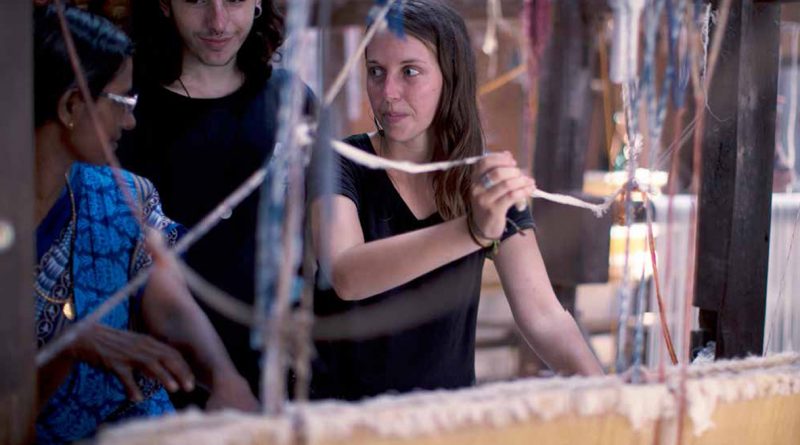Crafting Kerala’s Tourism Tale
-Dr. Venugopal C.K.
Professor,
Kerala Institute of Tourism and Travel Studies (KITTS)
The Handicrafts industry is intricately linked with tourism, their association deepening over the years as both sectors flourished. Festivals and cultural celebrations spotlight the craftsmen’s talents, reinforcing their significance. Every tourist spot in Kerala is steeped in cultural history, with craftsmen crafting enduring pieces that have gained global recognition. The famous “God’s Own Country” tagline comes alive as tourists explore Kerala’s natural beauty and rich heritage. The Handicrafts industry’s artisans have not only preserved traditional crafts but also boosted Kerala’s tourism, creating a harmonious blend of culture and allure. The rich tradition of handicrafts in Kerala is intricately interwoven into the culture of this land. Handed down over the generations, the handicrafts of Kerala still maintain their quality and mystique thanks to the hard work and dedication of their creators. This is one of the main reasons why tourists throng the destinations of Kerala. Providing a shopping experience that is unique, handicrafts showrooms recognized by the Government give tourists takeaways that become part of the cherished memories of their experience. This, in fact, has helped the state to attract more tourists, thereby contributing to the exchequer.
Products made out of coir, wood, clay, and metals are just some of the contributions of these craftsmen. In addition to coir, coconut shell products are also in great demand among tourists. Many outlets showcase souvenirs, mementos, gift articles, and similar products across the state. Fairs and exhibitions are also conducted at regular intervals to market these products. Aranmulakannadi is a world-famous handicraft product made from a metal-alloy combination. The exact mixture is a closely guarded secret of a family based in Aranmula. It is not surprising that this sleepy town has come to the limelight due to the immense popularity of this handmade mirror. The Aranmula Kannadi is now an iconic symbol of the cultural heritage of Kerala. Replicas of murals displayed on the walls of temples and churches are also much sought after by tourists. The fact that the colors used in these paintings are made out of vegetable and mineral pigments adds value to these souvenirs. Products made out of cane are no less in demand, contributing significantly to the state’s economy.
Bamboo and reed products are also much sought after by both tourists and locals. Another evolving handicraft field is the screw pinebased products. Woodcrafts of Kerala are also wellknown among both domestic and foreign tourists. Numerous temples and traditional homes house these kinds of works. Netturpetti or aada petti, yet another iconic symbol of Kerala’s tradition, is an exquisitely crafted ornamental box used to keep jewelry by the elite in ancient Kerala. Made from teak, rosewood, jack, and wild jack, this is often given as a gift to dignitaries and also as a memento. Bell metal craft is another art that has contributed immensely to tourism and allied industries.
Lacquer Ware, the craft combining metal and wood, is another sought-after product by tourists visiting Kerala. Other traditional items include the Kathakali mask, Nettipattam (caparison for elephants), Kasavu Sari, replica of Kettuvallam (the rice barge), uruli, and the traditional lamps of Kerala. Exotic products made out of sandalwood are also much in demand. Kerala tourism has published the approved list of souvenir shops in Kerala for tourists who wish to procure souvenirs to preserve their travel experiences. This has helped tourists to get their preferred products from genuine vendors at reasonable rates. The arts and crafts village located at Vellar in Thiruvananthapuram gives visitors deep insights into the traditional, folk, and ethnic crafts and artifacts of Kerala. The Iringal village in Kozhikode is famous for showcasing artistic heritage and traditional craftsmanship.
The Kerala Arts and Crafts village, Sargaalaya, is an initiative of Kerala Tourism. One of the oldest cooperative societies in India, the Kanhirode Weavers Cooperative Society Ltd was established in 1952. Situated in Kannur, it is well known for creating high-quality furnishing fabrics, shirts, sarees, and Khadi material. Aruvacode, a village near Nilambur, has a different story to tell. Here, a movement called Kumbham has changed the lives of a good number of potters who had almost left their traditional pottery making due to lack of patronage and modernity. Now Kumbham gives potters a perfect platform to exhibit their products and make a livelihood out of it. The traditional straw mat (pulpaya) making has received a new lease of life due to the initiatives of the Kuruva community in Kilimangalam village situated in Thrissur. Another notable handicraft product that has survived the onslaught of modern trends is the Kuthampully kasavu handloom sarees. Kuthampully village located in Thrissur has shown how a determined group of artisans managed to change their fortune through innovation and dedication. A similar handloom story has roots in Balaramapuram situated close to Thiruvananthapuram city.
The successful initiatives of Uravu, a nonprofit organization at Thrikkaipetta village located in Kalpatta, is an inspiring one. A wing of the State Bamboo mission formed under the aegis of the Department of Industries, Uravu makes good use of technology to design high-quality bamboo products. The lives of tribes who were traditional bamboo product makers have become easier and more fruitful out of this initiative. As elucidated above, it can be seen that handicrafts and tourism go hand in hand. The artisans who were in misery and on the verge of winding up their traditional jobs are now happily resettled. This has been made possible by connecting their skills and outputs with tourism in the state. Kerala tourism has certainly lived up to its tagline by giving a dignified livelihood to artisans who were deprived of their rightful place in society. Handicrafts, the traditional strength of Kerala, have been revived by this symbiosis thanks to the unrelenting support from the Government.


